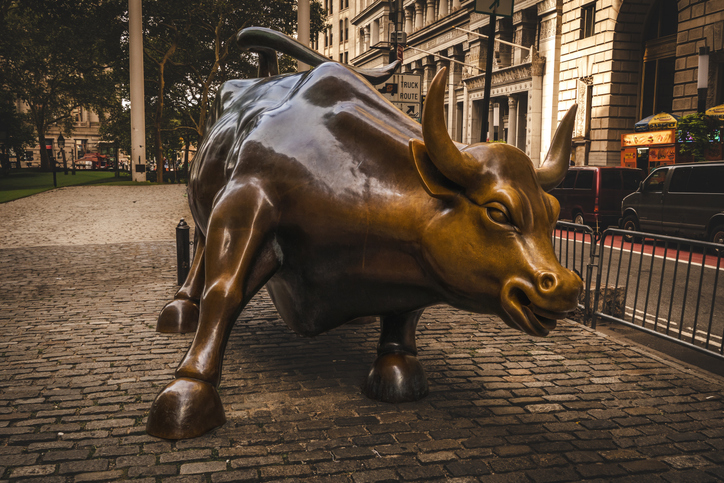My alarm goes off at 5:30 am every workday morning, and this past Wednesday was no exception. Having gone to bed around 9:30 pm on Tuesday night, I immediately checked the Associated Press (AP) app on my phone to see the election results. This as opposed to fixing coffee and doing the Wordle, which is what I normally do first thing.
Truthfully, I wasn’t surprised. However, I wouldn’t have been so had the vote tally gone the other way, either. It is difficult to place too much trust in the polls, and nothing in the political arena shocks me any longer.
What DID get my attention was the pre-market trading in U.S. stocks. From the AP, I went straight to Yahoo Finance, and then Bloomberg, to find domestic equity futures were up a ridiculous amount. The Dow Jones Industrials Average (Dow) was up over 1,200 points, and the sun hadn’t even risen yet. And bonds? Good grief. They were going the opposite direction by almost the same amount.
Let’s just say it was a pretty sharp reaction to an election, and a somewhat unusual way to start the day. Regardless, I got the Wordle in 4 tries, which is pretty much my average. So, I knew there was at least some normalcy in the world.
But why the extreme in the markets? Didn’t investors know either Donald Trump or Kamala Harris would win the election? Wasn’t it supposedly close enough that any outcome shouldn’t have been so, well, astonishing? Wasn’t the pick essentially between two relatively known entities? Further, hasn’t the stock market performed pretty well the last couple of years? If so, and there aren’t any ifs about it, why the exuberance over a change in the Administration?
I am sure there are any number of other folks wondering that same question.
In truth, the market would have rallied yesterday regardless of who had won the election. The reason being is investors hate “uncertainty.” Having that whole unpleasantness in the rearview mirror would have eliminated it, at least as it pertains to the political landscape. While rallies don’t always happen the day after an election, they happen frequently enough to make it the wise bet given even odds.
But, again, that doesn’t explain the severity of the market reaction does it? I mean over 1,500 points on the Dow just because an election is over? That seems a bit too, shall we say, convenient. Doesn’t it?
Perhaps.
I could make a decent argument the vitriolic nature of this year’s campaign, coupled with the divergent worldviews of the Presidential candidates, undoubtedly made investor uncertainty that much more severe.
Think of it this way: Have you ever dreaded doing something? Like having your spouse or significant other drag you to some event you really, and I mean really, don’t want to attend? I am talking about anticipating the function like you would having a root canal. Then, while it might not be your idea of fun, it happens and it is over. Done, and you don’t have to listen about it or dread it any longer.
If you can follow that example, you might be able to cast this simplistic logic onto domestic investors on Wednesday. After all, there is no way on God’s green earth everyone enjoying yesterday’s rally voted for Trump. I mean zero, zip, nil, nada, none and the null set. No way. Yet, Harris supporters were down there in the proverbial pits yesterday, squeezing extra dimes out of their investment portfolios.
Make no bones about it, a crisis is a horrible thing to waste, particularly when you are making money from it.
Then, there is the issue of corporate taxation.
Consider this excerpt from Howard Gleckman’s blog on November 1, 2024, on taxpolicycenter.org:
“Tax increases: Nowhere do the candidates’ tax plans differ more. Harris would raise the current 21 percent corporate tax rate to 28 percent while Trump would cut the rate to 20 percent for most corporations and 15 percent for those that manufacture their products in the US.”
Frankly, that spread between 15-28% is a huge difference, and I am talking about enormous.
- On $1 billion in pre-tax income, that equals $130 million.
- On income of $1 million, that is, obviously, $130,00.
Trust me, investors like free profits, and the CFO’s office can do a lot of stuff at a small business with an extra $130K hitting the bottom line.
This is important because investors were starting to wonder what the stock market could do for an encore in 2025. Recently, corporate profitability has been fine, if a little underwhelming compared to analysts’ estimates. Further, just about everyone is forecasting a slight slowdown in economic activity to start the year. No, it won’t be Armageddon, but it could be enough to slow down or halt any continued growth in “earnings per share.”
Obviously, that would/could/should have a negative impact on share prices. That isn’t terribly intuitive. However, what would happen IF a candidate proposing tax cuts wins an election while investors are fretting about future profitability? If yesterday’s rally is any indication, it would be like finding a golden ticket inside a Whipple-Scrumptious Fudge-Mallow Delight Wonka Bar.
To that end, I imagine even the bluest of the blue corporate CEOs wouldn’t be willing to pay 28% in taxes to the IRS when all they HAVE to pay is 15%. If you can find one, please wait and buy the dip.
But all of this begs the question: “Wouldn’t this decrease in the corporate tax rate be bad for the Federal budget deficit?” While that may seem intuitive, the most honest answer is maybe. After all, if Company ABC can use the tax savings to grow their business more rapidly and/or increase shareholder wealth, the increase in general economic and market activity might be enough to offset any decrease in tax receipts due to the lower tax rate.
You have to remember: Reducing a tax rate is NOT the same as reducing taxes.
Consider this: in 2017, the same year as the ex-President-elect’s “Tax Cuts and Jobs Act,” total income taxes in the United States were $1,587.1 billion. In 2024, they are estimated to be $2,503.4 billion.
- That is a 57.7% increase in nominal income tax receipts.
Conversely, Gross Domestic Product (GDP) grew from $19,612.1 billion at the end of 4Q 2017 to $29,349.92 billion at the end of 3Q 2024.
- That is a 49.65% increase in nominal economic activity.
How could tax receipts increase faster than nominal GDP growth after a cut in marginal tax rates? Pretty neat trick, huh? Unfortunately, all of these data points are on my Bloomberg terminal which I can’t share with you via a hyperlink.
The basic concept is a smaller piece of a larger pie will often be bigger than a large piece of a small pie. If that is hard to envision, cut a 16” pizza into 8 even slices and a 12” one into 6. Which has the larger individual pieces? If you answered the 16” pizza, you win. Ah yes, πR2 to the rescue!!! I knew I would use it one day!
So, there you have it. Why the market reaction was so severe on Tuesday, or at least a few of the potential reasons. Suffice it to say, there are undoubtedly others. However, when presented with an opportunity to make money, investors will focus on the known, or easily inferred, when they have the chance.
Put another way. People will often vote with their hearts. Investors always vote with their wallets. Believe it or not, that was on my mind on Wednesday morning after I got the Wordle in 4.
Have a great weekend.
Thank you for your continued support. As always, I hope this newsletter finds you and your family well. May your blessings outweigh your sorrows on this and every day. Also, please be sure to tune into our podcast, Trading Perspectives, which is available on every platform.

John Norris
Chief Economist
Please note, nothing in this newsletter should be considered or otherwise construed as an offer to buy or sell investment services or securities of any type. Any individual action you might take from reading this newsletter is at your own risk. My opinion, as well as those of our Investment Committee, is subject to change without notice. Finally, the opinions expressed herein are not necessarily those of the rest of the associates and/or shareholders of Oakworth Capital Bank or the official position of the company itself.



